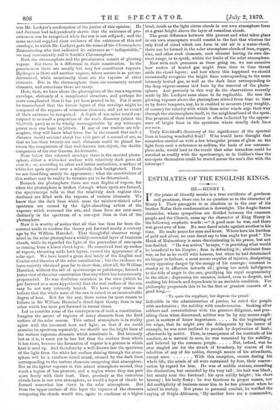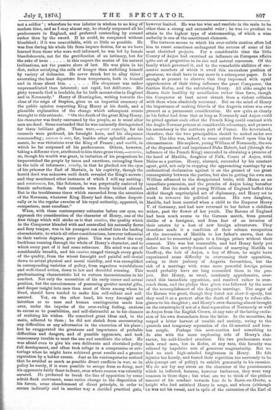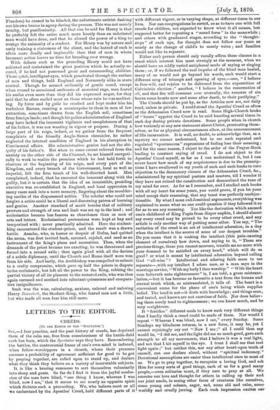ESTIMATES OF THE ENGLISH KINGS.
III.—HENRY I.
IF the praise of friendly monks is a true certificate of goodness and greatness, there can be no question as to the character of Henry I. Their panegyric is as absolute as in the case of his brother Rufus their condemnation is downright. The Anglo-Saxon chronicler, whose sympathies are divided between the common people and the Church, sums up the character of King Henry in the following emphatic words :—" A good man he was, and there was great awe of him. No man dared misdo against another in his time. He made peace for man and beast. Whose bore his burthen of gold and silver, no man dared say to him aught but good." The Monk of M.almesbury is more discriminating in his praise, but not less decided. "He was active," he says, "in providing what would be beneficial to his Empire ; firm in defending it ; abstinent from war, as far as he could with honour, but when he had determined no longer to forbear, a most severe requiter of injuries, dissipating every opposing danger by the energy of his courage ; constant in enmity or in affection towards all ; giving too much indulgence to the tide of anger in the one, gratifying his royal magnanimity in the other ; depressing his enemies, indeed, even to despair, and exalting his friends and dependents to an enviable condition. For philosophy propounds this to be the first or greatest concern of a good king,— ' To spare the suppliant, but depress the proud.'
Inflexible in the administration of justice, he ruled the people with moderation ; the nobility with condescension. Seeking after robbers and counterfeiters with the greatest diligence, and pun- ishing them when discovered, neither was he by any means negli- gent in matters of lesser importance In the beginning of his reign, that he might awe the delinquents by the terror of example, he was most inclined to punish by deprivation of limb ; afterwards by mulct. Thus, in consequence of the rectitude of his conduct, as is natural to men, he was venerated by the nobility, and beloved by the common people Nor, indeed, was he ever singled out for the attack of treachery, by reason of the rebellion of any of his nobles, through means of his attendants, except once. With this exception, secure during his whole life, the minds of all were restrained by fear, their conver- sation by regard for him. He was of middle stature, exceeding the diminutive, but exceeded by the very tall ; his hair was black, but scanty near the forehead ; his eyes mildly bright ; his chest brawny ; his body fleshy ; he was facetious in proper season, nor did multiplicity of business cause him to be less pleasant when he mixed in society. Not prone to personal combat, he verified the saying of Scipio Africanus, My mother bore me a commander, not a soldier ' ; wherefore he was inferior in wisdom to no king of modern time, and as I may almost say, he clearly surpassed all his predecessors in England, and preferred contending by counsel rather than by the sword. If he could, he conquered without bloodshed ; if it was unavoidable, with as little as possible. He was free during his whole life from impure desires, for as we have learned from those who were well informed, he was led by female blandishments, not for the gratification of an intimacy, but for the sake of issue in this respect the master of his natural inclinations, not the passive slave of lust. He was plain in his diet, rather satisfying the calls of hunger than surfeiting himself by variety of delicacies. He never drank but to allay thirst ; execrating the least departure from temperance, both in himself
and in those about him His eloquence was rather unpremeditated than laboured ; not rapid, but deliberate. His piety towards God is laudable, for he built monasteries in England and in Normandy." Henry of Huntingdon, writing towards the close of the reign of Stephen, gives us an impartial summary of the public opinion respecting King Henry at his death, and a plausible explanation of the change which subsequent events wrought in this estimate. "On the death of the great King Henry, his character was freely canvassed by the people, as is usual after men are dead. Some contended that he was eminently distinguished for three brilliant gifts. These were, —great sagacity, for his counsels were profound, his foresight keen, and his eloquence .commanding; success in war, for, besides other splendid achieve- ments, he was victorious over the King of France ; and wealth, in which he far surpassed all his predecessors. Others, however, taking a different view, attributed to him three gross vices,—avarice, -as, though his wealth was great, in imitation of his progenitors he impoverished the people by taxes and exertions, entangling them in the toils of informers ; cruelty, in that he plucked out the eyes -of his prisoner the Earl of Mortain, in his captivity, though the horrid deed was unknown until death revealed the King's secrets ; and they mentioned other instances of which I will say nothing ; and wantonness, for, like Solomon, he was perpetually enslaved by -female seductions. Such remarks were freely bruited abroad. But in the troublesome times which succeeded from the atrocities -of the Normans, whatever King Henry had done, either despoti- cally or in the regular exercise of his royal authority, appeared, in comparison, most excellent."
When, with these contemporary estimates before our eyes, we -approach the consideration of the character of Henry, one of the first things which will strike us is that caution, the quality which in the Conqueror blended with and controlled his naturally fierce and fiery temper, was in his youngest son exalted into the leading characteristic, to which all other considerations, however influential in their various degrees, gave place. This was indeed the very 'backbone running through the whole of Henry's character, and to which every part of it had some reference. His mind was one of considerable breadth, and his caution ranged through every grade .of the quality, from the wisest foresight and painful self-denial down to actual physical and moral timidity, and was exemplified in corresponding varieties of policy, from sagacious watchfulness and well-timed action, down to low and deceitful cunning. This predominating characteristic led to curious inconsistencies in his -conduct. Not only the necessities of his early career and actual position, but the consciousness of possessing greater mental gifts, -and deeper insight into men than most of those among whom he lived, should have tended to make him self-reliant and self-
assured. Yet, on the other hand, his very foresight and intuition as to men and human contingencies made him -ever, under the impulse of the over-ruling feeling, anxious to excess as to possibilities, and sell-distrustful as to his chances -of realizing his wishes. He conceived great ideas and, in the main, adhered to them ; he did not shrink from encountering -any difficulties or any adversaries in the execution of his plans ; but he exaggerated the greatness and importance of probable -difficulties and dangers, and of possible opponents, and took unnecessary trouble to meet the one and conciliate the other. He -was afraid even to give his own deliberate and cherished policy dull development, and often took refuge in a compromise or sub- terfuge when he might have achieved great results and a greater avputation by a bolder course. Just as his contemporaries noticed that he avoided as much as possible direct conflicts in war, so in policy he rarely, if it were possible to escape from so doing, met his opponents fairly front to front, even where success was tolerably assured. Ile preferred to break the line of opposition by some adroit flank movement, some entire change in the disposition of his forces, some abandonment of direct principle, in order to secure indirectly and in another way a decided practical gain,
however limited. He was too wise and resolute in the main to be other than a strong and successful ruler ; he was too prudent to attain to the highest type of statesmanship, of which a wise audacity is one of the constituent elements.
The tortuous means to which his over-subtle caution often led him to resort sometimes endangered the success of some of his most cherished projects. For a considerable time the little County of Anjou had exercised an influence on European affairs quite out of proportion to its size and natural resources. Of the family which governed it, and to the remarkable abilities of suc- cessive members of which it owed this anomalous position of greatness, we shall have to say more in a subsequent paper. It is enough at present to observe that they impressed with equal apprehension of their rising influence the great Conqueror, • the fearless Rufus, and the calculating Henry. All alike sought to disarm their hostility by conciliation rather than force, though the Conqueror at least never shrank from a violent collision with them when absolutely necessary. But on the mind of Henry the importance of making friends of the Angevin rulers was ever present as a paramount consideration. He saw quite as clearly as his father had done that as long as Normandy and Anjou could be pitted against each other the French King could contend with the Anglo-Norman princes at considerable advantage, and preserve his ascendancy in the northern part of France. He determined, therefore, that the two principalities should be united under one rule. The idea was, indeed, to some extent forced upon him by circumstances. His nephew, young William of Normandy, the son of the dispossessed and imprisoned Duke Robert, had (through the influence of the French King) succeeded in obtaining a promise of the hand of Matilda, daughter of Falk, Count of Anjou, with Maine as a portion. Henry, alarmed, succeeded by his constant agent, gold, not only in stopping the approaching marriage by an ecclesiastical declaration against it on the ground of too great consanguinity between the parties, but also in getting his own son William affianced to the disappointed bride, with Maine as an immediate possession, and the promise of Anjou being hereafter added. But the death of young William of England baffled this skilful though unprincipled act of diplomacy, and Henry set to work to reweave his political meshes. His own daughter, Matilda, had been married when a child to the Emperor Henry V. of Germany, and had now returned to her father a childless widow, past the flower of her youth. The Barons of England had been much averse to the German match, from general dislike of a foreigner, and from fear of an invasion of their estates by a host of new foreign adventurers. They therefore made it a condition of their solemn recognition of the succession of Matilda to her father's crown, that she should not be remarried again to a foreign prince without their consent. This was but reasonable, and had Henry fairly put before them his newly-formed scheme of marrying Matilda to Geoffrey, the heir of Anjou, a boy of fifteen, he might have experienced some difficulty in overcoming their opposition, owing to their jealousy of Angevin favouritism, but the risk of a marriage with some more powerful foreign prince would probably have ere long reconciled them to the pro- ject. But Henry, as usual, cautiously apprehensive, over- rated this immediate opposition, and resolved rather to over- reach them, and the pledge thus given was followed by the news of the accomplishment of the Angevin marriage. The anger of the Barons was great, though they dared not show it openly, but they used it as a pretext after the death of Henry to refuse alle- giance to his daughter ; and Henry's over-finessing almost brought on the catastrophe if not of a final separation of Normandy as well as Anjou from the English Crown, at any rate of the lasting exclu- sion of his own descendants from the latter. In the meantime, he reaped a bitter harvest of trouble and anxiety, owing to the quarrels and temporary separation of the ill-assorted and love- less couple. Perhaps this over-caution had something to do also with the more unpleasing side of Henry's cha- racter, his cold-blooded cruelties. His two predecessors were both cruel men, but in Rufus, at any rate, this ferocity was relieved by impulsive acts of generous magnanimity. But we find no such high-minded forgiveness in Henry. He felt injuries too keenly, and feared their repetition too nervously to be able (except out of policy) to exhibit generosity to his enemies. We do not lay any stress on the character of the punishments which he inflicted, because, however barbarous, they were very common in those days ; but what are we to think of the pitiless rancour of his conduct towards Luc de la Barre-en-Ouche, a knight who had satirized Henry in songs, and whom (although he was not his vassal, and in spite of the entreaties of the Earl of
Flanders) he caused to be blinded, the unfortunate satirist dashing out his own brains in agony during the process. This was not merely cruelty, but pusillanimity. All that can be said for Henry is that he probably felt the satire much more keenly than an unlettered man would have done, and that he abused the power of a king to avenge the animosity of a student. For Henry was by nature and early training a statesman of the closet, and the hatred of such is often more deadly and implacable than that of men in whom incessant action leaves no time for brooding over wrongs.
With defects such as the preceding Henry could not have achieved and maintained the great position which he actually se- cured, if he had not possessed great and commanding abilities. Those quiet, intelligent eyes, which penetrated through the surface of men and things, held England and Normandy alike in stern control. Though he seemed ordinarily of gentle mood, except when roused to occasional outbursts of ancestral rage, men feared his smiles even more than they did his expressed anger, for they said that he often smiled most on those whose ruin he was meditat- ing. By force and by guile he crushed and kept under him his turbulent Barons, creating a counterpoise to them in men of low extraction, sometimes drawn from the English soil, sometimes from foreign lands; and though his police administration of England may have lacked the incessant vigilance and completeness of that of his father, it was not wanting in vigour or purpose. During a large part of his reign, indeed, as we gather from the frequent complaints of the friendly Anglo-Saxon chronicler, he rather neglected the internal condition of England in his absorption in Continental affairs. His administrative genius had not the ubi- quity of his father's. But when to some extent relieved from the anxiety on the other side of the Channel, he set himself energeti- cally to work to realize the promises which he had held forth in charters at the beginning of his reign, and every part of the Kingdom, and every branch of the Government, local as well as imperial, felt the firm touch of his well-directed hand. Men - complained, indeed, that he executed the innocent along with the guilty, but it is certain that the idea of an irresistible, presiding executive was re-established in England, and local oppression in many cases sank into a mere memory, lingering about the moulder- ing castles of the dispossessed nobles. The scholar who could not forgive a satire could be a liberal and discerning patron of learning and genius. Another standard of merit besides that of military prowess and strength of arm and limb was set up in the land ; and ecclesiastics became less famous as churchmen than as men of arts and letters. Ecclesiastical pretensions were kept at bay and temporized with ; never practically admitted. Here the student- king encountered the student-priest, and the result was a drawn battle. Anselm, who, in horror or despair of Rufus, had quitted the arena, was first invited back, caressed, cajoled, and used as an instrument of the King's plans and necessities. Then, when the demands of the priest became too exacting, he was threatened and forced into a second exile ; then again plied with all the devices of a subtle diplomacy, until the Church and Rome itself were won from his side. And lastly, the Archbishop was compelled to submit to a crafty compromise, which gave up half the points in dispute tothe ecclesiastic, but left all the power to the King, robbing the partial victory of all its pleasure to the restored exile, who was then again caressed and soothed into reluctant quiescence and compara- tive insignificance.
Such was the wise, calculating, anxious, unloved and unloving Henry Beauclerk, the Student-King, who feared men not a little, but who made all men fear him still more.
































 Previous page
Previous page